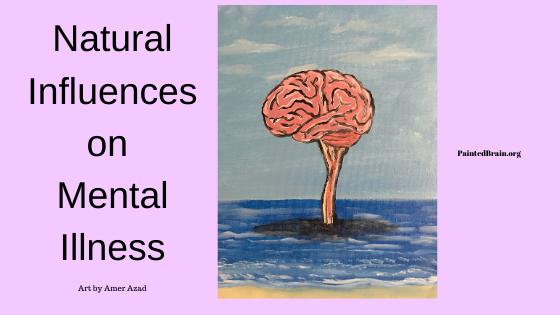Mental illnesses are not just developed for social or psychological reasons. Mental illnesses also exist from biological factors. Biological influences can create unhealthy mental and behavioral patterns that can be categorized as a type of illness such as bipolar, dissociative, schizophrenic, depression, or eating disorder to name a few.
Sometimes these illnesses have their root in an individual’s biology. Natural remedies for biological-based cases have been undermined to some extent. The pharmaceutical industry has done a moderate effort to address these illnesses naturally.
Natural solutions – such as nutrition and natural supplementation and even environmental changes – can alleviate people’s symptoms that have their roots in genetics, poor diets, injuries, infections, environmental toxins, or substance abuse.
[Related: Ecotherapy: Why Plants are the Latest Treatment for Depression and Anxiety]
Granted, mental illness is a vast and complex issue. But could it be that in some cases a simple change in diet could significantly reduce symptoms?
A recent study led by Professor Jim E. Banta, Ph.D., published in the International Journal of Food Sciences and Nutrition found that individuals who consume more junk food had a greater risk for developing psychological distress. There have been multiple similar studies that link mental illnesses to unhealthy diets. There might be sufficient evidence linking mental illness to poor diets and it can very well be that habitual consumption of unhealthy meals not only provides poor nutrition, it can also trigger mental impairments and illnesses.

Our bodies require substantial energy to survive. Clean and nutritionally dense food is more easily used by our bodies. Our brains take up a high percentage of the energy we consume in order to think and function properly.
Our body feeds our brain with essential nutrients necessary to convert and build healthy neurological pathways. Vitamins assist our brain’s neurotransmitters to develop better and communicate better. Unsurprisingly, vitamin deficiencies have also been linked to mental illnesses. Vitamins such as vitamin D, iodine, Omega oils, Zinc, B-12 are a few that have been shown to improve cognitive function.
Various studies show people see an improvement in depressive symptoms after they are diagnosed deficient in vitamin D and supplemented with it.
Simple changes in meals might not be enough. Sometimes it requires supplementing a targeted vitamin or mineral to alleviate some mental illnesses. But changes in food choices do help and it is generally better overall to consume healthy foods. Healthy meal choices topped with vegetables and fruits are more nutritionally dense meals that provide more of the essential vitamins and minerals our brains need to develop and function better. Junk food is usually fried and processed so much that it losses most of its nutrients.
It is important to talk to your doctor about your diet and if this is something that is contributing to your mental illness. Considering engaging in a healthy diet can help with improving your mental health. It does not hurt to cut down on junk food for better mental health!
References
Jim E. Banta et al, Mental health status and dietary intake among California adults: a population-based survey, International Journal of Food Sciences and Nutrition (2019). DOI: 10.1080/09637486.2019.1570085 )

